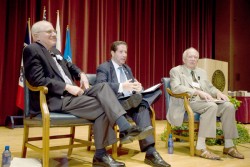 William Taubman, David Maxwell and Sergei Khrushchev share the stage. |
A complex, contradiction-filled portrait of Soviet leader Nikita Khrushchev was offered Thursday night at Drake University by two of the legendary man’s biographers, one of whom is his son.
The lively, insightful discussion that drew a crowd of 650 to Sheslow Auditorium was part of Drake’s observance of the 50th anniversary of Khrushchev’s Iowa visit.
The event fulfilled what Drake President David Maxwell described in his introductory remarks as the university’s responsibility to be a place “where the community comes together to talk about important issues of the day; where diversity of ideas and views are accepted and encouraged.”
View more photos of the lecture and Khrushchev’s 1959 Iowa visit in an online gallery.
Scholar William Taubman, a longtime friend of President Maxwell, began the evening with a lecture based on his Pulitzer Prize-winning biography, “Khrushchev: The Man and His Era.” He was later joined in a brief discussion with Maxwell and Khrushchev’s son, Sergei Khrushchev, a senior fellow at the Watson Institute for International Studies at Brown University and author of several books about his father.
Nikita Khrushchev came to Iowa in 1959 to see Roswell Garst, who had invited him to tour his Coon Rapids farm in order to share with the Soviets the advances that Americans had made in mechanized grain production, especially hybrid corn.
Iowa was just one stop on Khrushchev’s tour of the United States. It was the first time a Soviet leader had been invited to America, and much of the trip was stressful
for Khrushchev.
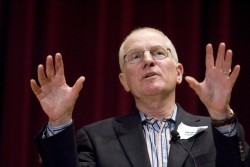 William Taubman emphasizes his point with gestures. |
The Iowa stop was a “balm to Khrushchev’s soul, especially his visit to
the Garst farm,” said Taubman, the Bertrand Snell professor of
political science at Amherst College.
He then described Roswell Garst as smart, earthy and cantankerous,
adding that Khrushchev liked him because the Iowan talked back to him
and engaged him in debate.
Taubman told an amusing story, detailed in his book, about Garst’s
visit to the Soviet Union in 1955. He asked Khrushchev how the Russians
could know so little about American agriculture when they had managed
to steal the atomic bomb in three weeks. Khrushchev immediately
corrected Garst, informing him that it only took two weeks: “You locked
up the atomic bomb, so we had to steal it. When you offered us
information about agriculture for nothing, we thought that might be
what it was worth.”
The Iowa experience was important because it helped Khrushchev
accept that the United States was way ahead of the Soviet Union in many
things, particularly agriculture. The Soviet leader knew his country
would “have to move mountains to catch up with the U.S.,” Taubman said.
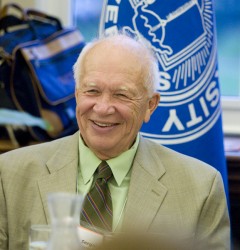 Sergei Khrushchev bears a striking resemblance to his father. |
Much of Taubman’s talk focused on his description of Khrushchev as
“one of the most important political leaders of the 20th Century and
also one of the most contradictory and colorful.”
Taubman noted how Khrushchev had humble origins, but became part of
Stalin’s inner circle. He was complicit in Stalin’s purges, and played
a role in the deaths of thousands of people. But he went on to
de-Stalinize the Soviet Union, releasing political prisoners and
pardoning the alleged crimes of those killed during Stalin’s rule.
He gave “Communism a human face, but his reforms were real,” Taubman said.
He reduced taxes for farmers, raised prices for what they produced
and encouraged individual farm plots. He expanded housing, eased
restrictions on artistic expression and reformed education. He also
ignited the Cuban missile crisis, an act that demonstrated his erratic,
confounding decision-making.
“Only he would have put those missiles in Cuba,” said Taubman.
“From everything we know about the attitudes of the people in the
leadership who were the main advisers on things American, these people
were aghast to learn this was going to happen.”
Based on his research, Taubman suggested the “highs and lows” of
Khrushchev’s personality may have played a role in his iconoclastic
style of leadership.
Taubman said Khrushchev believed communism would improve the lives
of Russians, but that he was haunted by his actions under Stalin’s
regime. This guilt and shame led him to denounce Stalin.
Taubman said Khrushchev was once asked if he had any regrets, and
the former Soviet leader reportedly replied: “The blood. My arms are up
to my elbows in blood. It is the most terrible thing that lies in my
soul.”
When asked about his father’s mental state, Sergei Khrushchev said,
“I never saw the depression of my father. He would be angry. He could
be sad. But he was never in depression.”
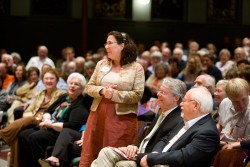 Rachel Garst asks a question about her grandfather’s role in ending the Cold War. |
It seemed appropriate that one of the last comments of the night
came from a member of the Garst family, who told Khrushchev: “My name
is Rachel Garst and I was raised to believe my grandfather
singlehandedly stopped the Cold War.”
Khrushchev explained how the relationship between Roswell Garst and
his father developed in the context of the Cold War, concluding with,
“Your grandfather was one who made a hole in the Iron Curtain. . . He
didn’t end the Cold War. He was the person who started the road to the
end of the Cold War.”
The lecture, part of the AViD Series sponsored by the Des Moines
Public Library, was preceded by a special dinner hosted by Drake in the Cowles Library Reading Room.
Guests of honor included Sergei Khrushchev and a Russian delegation
of political and business leaders visiting Iowa for the 50th
anniversary of Khrushchev’s visit.
A highlight of the dinner was
President Maxwell’s welcome toast, which he delivered in Russian and
was translated into English by an interpreter.
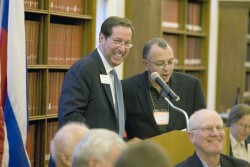 President Maxwell presents a traditional welcome toast in Russian. |
President Maxwell holds a bachelor’s degree in Russian area studies
from Grinnell College and master’s and doctorate degrees in Slavic
languages and literatures from Brown University.
He was a Fulbright Fellow in Moscow from 1970-71. He first toured
the Soviet Union in 1962 as a band boy for the Benny Goodman Band,
which included his father, legendary jazz musician and lead trumpet
Jimmy Maxwell. During the tour, Maxwell had the opportunity to meet
Nikita Khrushchev briefly at the U.S. Embassy’s 4th of July party.
“Bill Taubman’s talk, and Sergei Khrushchev’s contributions to the
discussion, provided powerful insights into the life of one of the 20th
century’s most important figures,” President Maxwell said.
“I think that we all came away from the evening — as one does from
reading Prof. Taubman’s book on Khrushchev — with a much more nuanced
sense of the remarkable contradictions in Khrushchev’s personality and
actions, with a much more nuanced sense of the incredible complexity of
a man who appeared, from our distant perspective in this country, to be
so simple.
“For those of us in attendance, it was an historic event in
commemoration of another historic moment — Khrushchev’s visit to Iowa
in 1959.”

